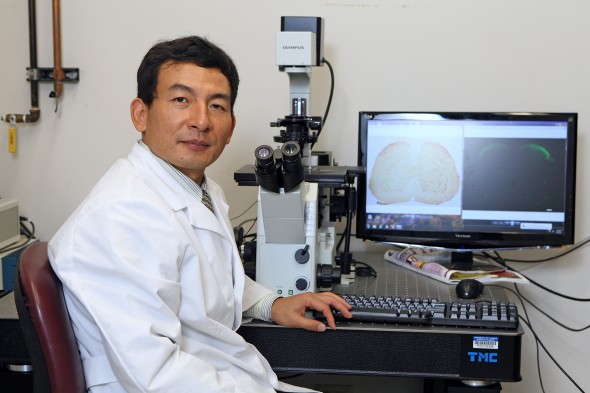2018 Researcher of the Year Jim Wang
Zaijie (Jim) Wang
Distinguished Researcher
Basic Life Sciences
For more than 20 years, Zaijie (Jim) Wang has been studying chronic pain and drug addiction. Specifically, the University of Illinois at Chicago researcher has worked to understand the mechanisms behind pain — how it develops and how it is treated — and ways to fight the addictive nature of some painkillers.
“We have a wide range of solutions for helping people with acute pain, but when it comes to chronic pain, we have a huge problem,” said Wang, professor of pharmacology and pharmaceutics at the UIC College of Pharmacy. “The medications we have are better for acute pain, but people who have enduring, long-lasting pain are left with limited options.”
Wang, who joined the UIC faculty in 2001, believes that while chronic pain, tolerance and addiction to opioid painkillers, and sensitivity to pain are complex issues that have many independent instigating factors, there are also factors — such as certain receptors and intracellular signaling mechanisms in the body — that may underlie all these processes. He wants to find the common denominator.
Through his research, Wang has developed new methods to study ongoing chronic pain from sickle cell disease, cancer, multiple sclerosis and migraines, for example. Using an array of cellular markers and in vivo tests, his research team is able to study enduring non-evoked pain and sensitivity, which is more reflective of pain that is experienced by patients than studies that rely on reflex responses to painful stimulus. Wang’s research has also suggested that certain antipsychotics can be repurposed as therapeutic options to fight drug addiction and reduce inflammatory and neuropathic pain.
A significant portion of his work is focused on understanding pain from sickle cell disease, a condition characterized by irregularly shaped red blood cells. The blood cells, which are shaped like a sickle, are less flexible than normal cells; they, therefore, do not pass as easily through blood vessels, sometimes causing a blockage that slows or stops blood flow and prevents delivery of oxygen to nearby tissues and organs. Patients experience life-long chronic pain alongside episodes of severe pain that can require hospitalization.
In 2018, Wang received a rare type of funding from the National Institutes of Health to expand his research on the neurobiology of chronic pain in patients with sickle cell disease. The NIH’s Outstanding Investigator Award provided Wang with $4.6 million to pursue multiple areas of research simultaneously around the topic. With the funding, he hopes to identify molecular mechanisms and explore ways to target one or more of these mechanisms for controlling pain in sickle cell disease.
Wang was originally trained as a pharmacist. He went to graduate schools at the University of the Pacific and the University of California San Francisco, where he earned master’s and doctoral degrees, respectively. In addition to the NIH’s Outstanding Investigator Award, he serves as principal investigator on two R01 grants from the NIH and co-investigator on three other research projects.

